Key takeaways:
- Reparations politics involves addressing historical injustices, particularly against African Americans, requiring a thoughtful dialogue about accountability and healing.
- The debate over reparations encompasses various proposals, including financial compensation and policies aimed at equity, with differing opinions on responsibilities and implementation challenges.
- Arguments for reparations emphasize historical acknowledgment and economic justice, while opposing views highlight concerns about resentment, division, and practical feasibility.
- Personal experiences and discussions are crucial in shaping perspectives on reparations, highlighting the emotional and historical impacts on individuals and communities.

Understanding reparations politics
Reparations politics is a complex and often contentious issue that involves compensating communities for historical injustices, particularly those committed against African Americans. I often find myself reflecting on the deep emotional weight this topic carries, as it connects not just to numbers or policies but to the lived experiences of individuals and families. How can we measure the value of a heritage tarnished by oppression?
In my conversations with friends and family, I’ve noticed a palpable divide in opinions about the feasibility and fairness of reparations. Some passionately argue that it’s overdue justice, while others feel it opens up old wounds that society is still grappling with. I remember speaking to a colleague who shared stories of her ancestors’ struggles and how these narratives shape her sense of identity today. It’s moments like these that highlight the need for a thoughtful dialogue around reparations, as we navigate the intersection of historical grievances and contemporary realities.
The debates surrounding reparations also intersect deeply with questions of accountability and collective responsibility. I often wonder, what does it mean for society to take responsibility for the past? For me, the idea of reparations extends beyond financial compensation; it’s about acknowledging past wrongs and fostering a culture of healing and understanding. When I consider the potential impact of reparations on future generations, I feel a sense of urgency—it’s a chance to redefine relationships within our communities and work towards a more equitable society.
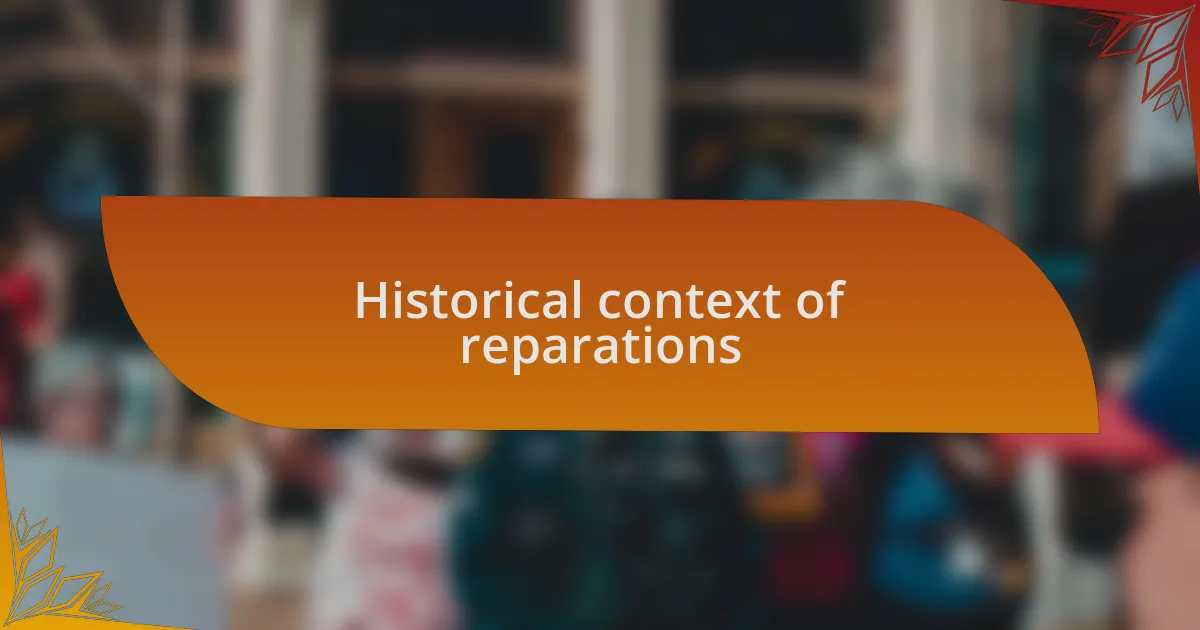
Historical context of reparations
Throughout history, reparations have often been tied to significant moments of injustice, such as slavery and colonialism. I remember studying how post-World War II Europe grappled with compensating victims of the Holocaust, which, while different in context, sparked a broader conversation about how societies reckon with their pasts. This historical precedent, I believe, provides a crucial framework for understanding the reparations debate in the United States today.
In the context of African American history, the conversation around reparations dates back to the Civil War era, particularly the promise of “40 acres and a mule.” Reflecting on this, I often feel a deep sense of irony; a promise made to empower individuals was never fulfilled and left generations struggling for acknowledgment and justice. How can we build a future when the foundations are still unsteady?
Looking back at the legacy of Jim Crow laws and systemic racism, it’s clear that many forms of reparative justice have emerged but often fall short of true accountability. I think about a friend whose family has been directly affected by these cycles of inequality; their stories highlight the emotional toll and disconnect that still resonates today. Have we done enough to really understand the breadth of these historical injustices, or do we risk repeating the same mistakes by not addressing them head-on?
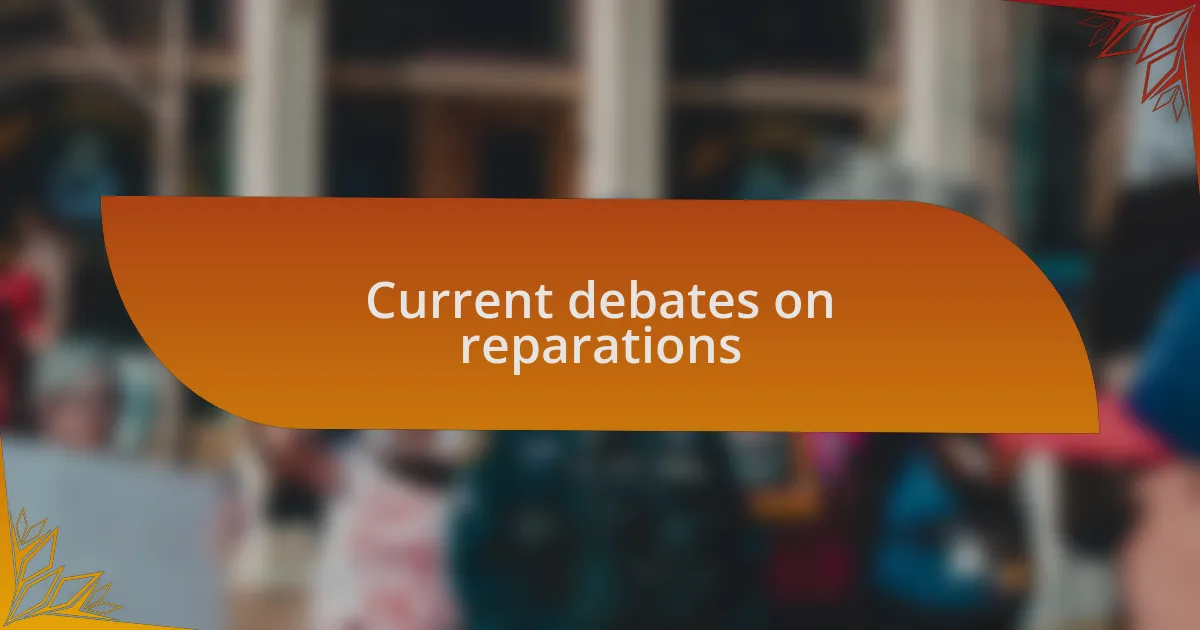
Current debates on reparations
Debates on reparations today often center around what form compensation should take. Should it be financial, or perhaps in the form of policies like education and housing equity? I find myself pondering this frequently. What does true restitution look like, and how do we measure the impact it would have on communities historically marginalized?
One contentious aspect of the discussion is who should receive reparations and who is deemed responsible for paying them. I remember debating this with friends, and we realized that perspectives vary widely based on personal histories and experiences. Can we find common ground, or does the argument inevitably divide us further?
Then there’s the question of timing and implementation. Some argue that it’s too late or too complicated to address the past. I can’t help but feel that delaying action only prolongs the pain. Isn’t taking meaningful steps towards healing a necessary part of moving forward?
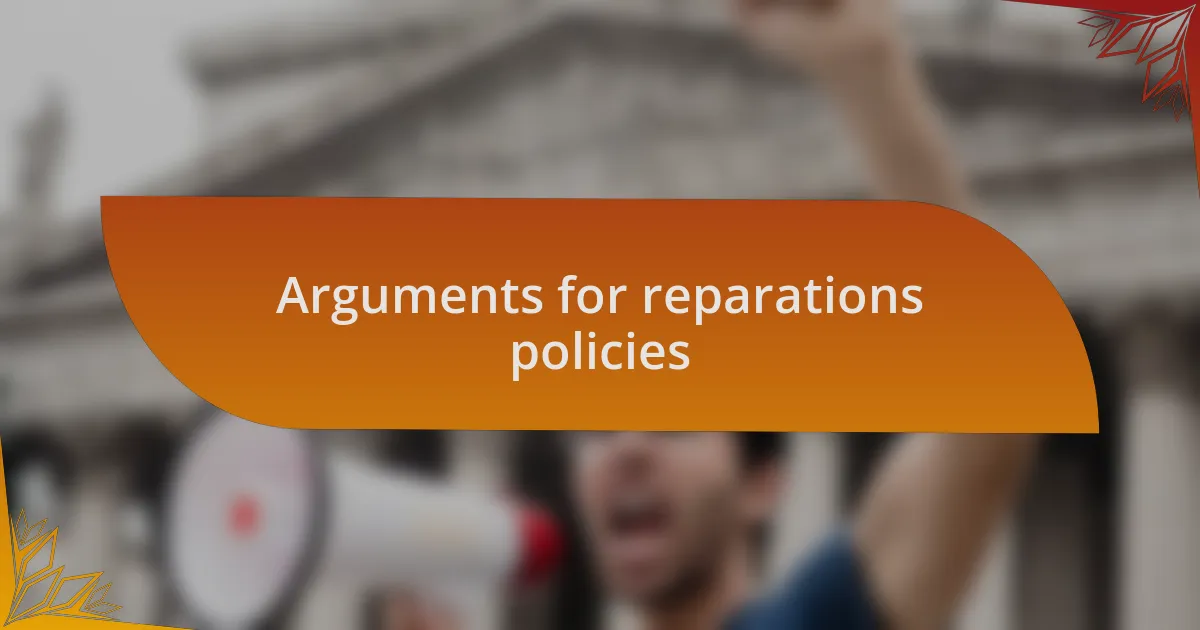
Arguments for reparations policies
One strong argument for reparations policies is the sheer historical injustice faced by marginalized communities. Growing up, I listened to my grandparents share their experiences and struggles, which were rooted in systemic inequalities. It made me realize that reparations aren’t just financial payments; they represent acknowledgment of suffering and a society’s willingness to confront its past wrongs. Doesn’t everyone deserve that recognition?
Moreover, reparations could pave the way for economic justice and recovery. I remember attending a seminar on wealth disparity, where the stark statistics were eye-opening; communities that faced historical oppression still lag significantly behind in wealth accumulation. If we don’t address these economic imbalances, can we truly call ourselves a fair society? Implementing reparations could change the narrative and provide real opportunities for advancement.
Finally, there’s a moral imperative that I believe we must consider. When I reflect on our collective responsibility, I can’t help but feel that reparations are essential for healing and reconciliation. It’s about repairing relationships and fostering understanding among all communities. If we want to cultivate a peaceful future, isn’t it vital that we first address the injustices of our past?
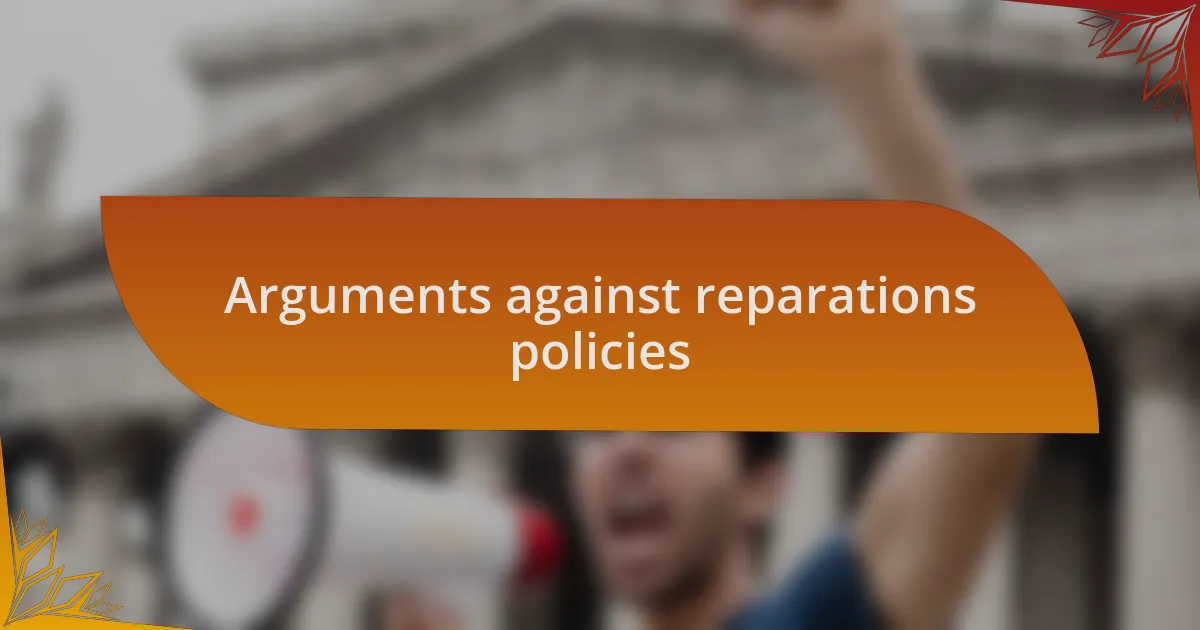
Arguments against reparations policies
One notable argument against reparations policies centers on the complexity of assigning responsibility for historical injustices. Many people I know feel that it’s unjust to expect individuals living today to compensate for the actions of their ancestors. I often find myself pondering: how can we fairly determine who owes whom? This issue of accountability creates division, making it harder to unite toward a common solution for addressing inequality.
Another point frequently raised is the potential for resentment among those who may not see the benefits of reparations. I’ve heard friends express concerns that implementing these policies could fuel animosity between different communities. Wouldn’t it be counterproductive if, instead of fostering healing, reparations begin to sow discord? It’s a perspective that merits consideration, as social cohesion is crucial for long-term progress.
Additionally, there are worries about the feasibility and effectiveness of reparations in practice. I remember chatting with a colleague who argued that providing financial payments or land grants could lead to logistics and administrative challenges that may overshadow the intended benefits. What if the resources allocated for reparations don’t address the root causes of inequality? It raises questions about whether reparations could truly create lasting change or merely become a symbolic gesture.
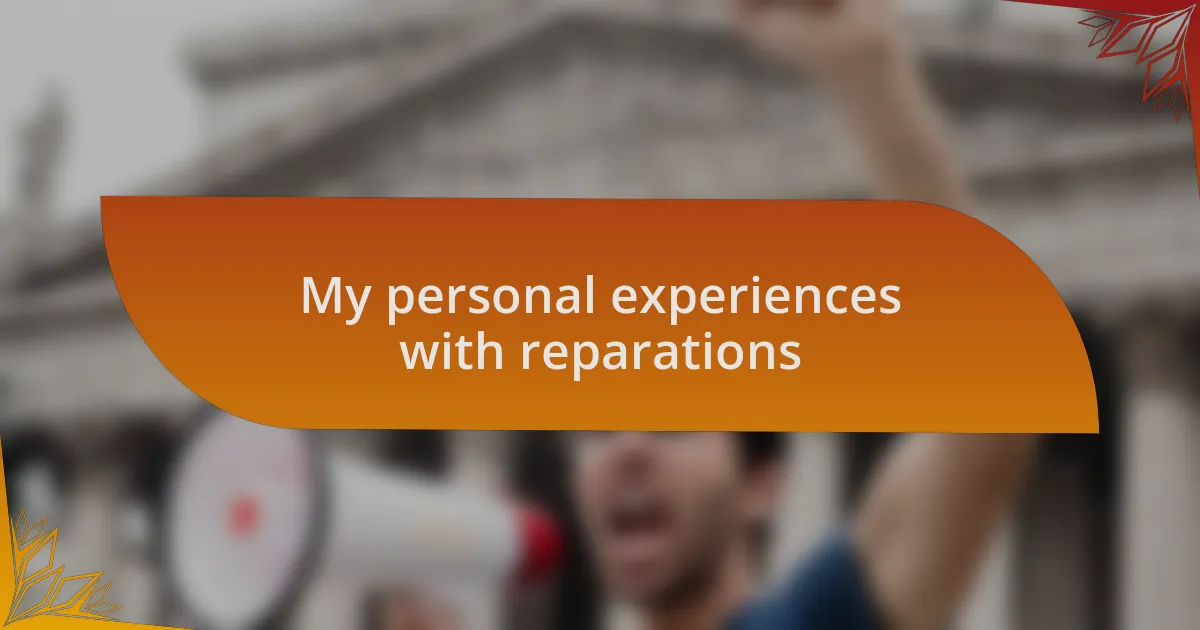
My personal experiences with reparations
My perspective on reparations is deeply shaped by conversations I’ve had with family members who have experienced systemic inequities firsthand. Hearing my grandparents share their struggles with discrimination and economic disadvantage made me realize how historical injustices affect generations. Their stories often leave me wondering, how can we truly honor their pain and resilience if we don’t engage with the idea of reparations?
In personal discussions around this topic, I’ve often found myself reflecting on my own identity and heritage. It’s a profound experience to reconcile the privileges I hold today with the injustices my ancestors faced. I remember a particularly poignant moment when I attended a community meeting discussing reparations; it stirred so much emotion in me, as I listened to people articulate both hope and skepticism. It made me question: can reparations be a pathway to healing for communities that have long felt invisible?
I also recall a powerful exchange with a friend who is skeptical of reparations. As we debated the issue, I found myself grappling with the fear that our differing views might halt important conversations. That encounter reminded me of the necessity for open dialogue in this debate. It’s essential to consider various perspectives, even if they differ from my own. Ultimately, it’s these interactions that form my understanding of reparations—not just as a policy, but as a deeply personal issue that resonates across many lives.
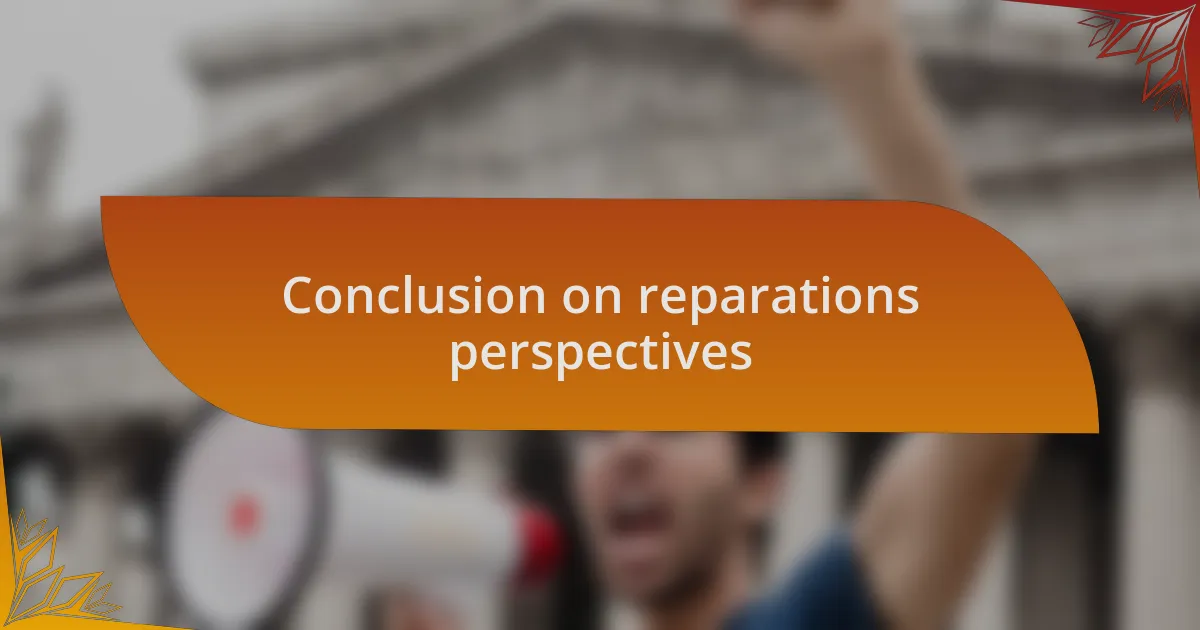
Conclusion on reparations perspectives
The landscape of reparations perspectives is as multifaceted as the stories behind them. Each viewpoint is steeped in unique histories and emotional truths that can’t be ignored. I often think about how these discussions resonate differently based on personal experiences; for example, when I recently facilitated a workshop on reparations, a participant shared how their family’s displacement echoes in their current socioeconomic struggles. It was a reminder that the impact of historical injustices is not just academic; it’s lived reality for many.
Engaging with diverse perspectives has illuminated the complexities surrounding reparations for me. During a panel discussion, an elder spoke with a mix of hope and frustration about the slow progress on reparative justice. Her words struck me deeply and posed a challenging question: is the current approach to reparations sufficient for those who have suffered for so long? I found myself leaving that event with a renewed sense of urgency to advocate for a more inclusive dialogue.
As I wrap my thoughts around the various arguments for and against reparations, I can’t help but feel the weight of responsibility. Each conversation, whether supportive or critical, adds layers to my understanding. The complexity of this issue urges me to continue asking: how can we create a path forward that not only acknowledges past wrongs but actively seeks to rectify them? It’s clear to me that the journey toward reparations is as much about healing collective wounds as it is about policy change, reminding us all of the importance of empathy in these discussions.